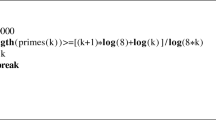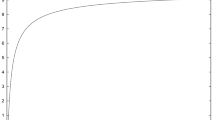Abstract
Let \({\mathbb {F}}_q\) be a finite field of characteristic p and order q. The Chevalley–Warning Theorem asserts that the set V of common zeros of a collection of polynomials must satisfy \(|V|\equiv 0\mod p\), provided the number of variables is sufficiently large with respect to the degrees of the polynomials. The Ax–Katz Theorem generalizes this by giving tight bounds for higher order p-divisibility for |V|. Besides the intrinsic algebraic interest of these results, they are also important tools in the Polynomial Method, particularly in the prime field case \({\mathbb {F}}_p\), where they have been used to prove many results in Combinatorial Number Theory. In this paper, we begin by explaining how arguments used by Wilson to give an elementary proof of the \({\mathbb {F}}_p\) case for the Ax–Katz Theorem can also be used to prove the following generalization of the Ax–Katz Theorem for \({\mathbb {F}}_p\), and thus also the Chevalley–Warning Theorem, where we allow varying prime power moduli. Given any box \({\mathcal {B}}={\mathcal {I}}_1\times \ldots \times {\mathcal {I}}_n\), with each \({\mathcal {I}}_j\subseteq {\mathbb {Z}}\) a complete system of residues modulo p, and a collection of nonzero polynomials \(f_1,\ldots ,f_s\in {\mathbb {Z}}[X_1,\ldots ,X_n]\), then the set of common zeros inside the box,
satisfies \(|V|\equiv 0\mod p^m\), provided \(n>(m-1)\max _{i\in [1,s]}\Big \{p^{m_i-1}\deg f_i\Big \}+ \sum \nolimits _{i=1}^{s}\frac{p^{m_i}-1}{p-1}\deg f_i.\) The introduction of the box \({\mathcal {B}}\) adds a degree of flexibility, in comparison to prior work of Sun. Indeed, incorporating the ideas of Sun, a weighted version of the above result is given. We continue by explaining how the added flexibility, combined with an appropriate use of Hensel’s Lemma to choose the complete system of residues \({\mathcal {I}}_j\), allows many combinatorial applications of the Chevalley–Warning and Ax–Katz Theorems, previously only valid for \({\mathbb {F}}_p^n\), to extend with bare minimal modification to validity for an arbitrary finite abelian p-group G. We illustrate this by giving several examples, including a new proof of the exact value of the Davenport Constant \({\textsf{D}}(G)\) for finite abelian p-groups, and a streamlined proof of the Kemnitz Conjecture. We also derive some new results, for a finite abelian p-group G with exponent q, regarding the constant \({\textsf{s}}_{kq}(G)\), defined as the minimal integer \(\ell \) such that any sequence of \(\ell \) terms from G must contain a zero-sum subsequence of length kq. Among other results for this constant, we show that \({\textsf{s}}_{kq}(G)\le kq+{\textsf{D}}(G)-1\) provided \(k>\frac{d(d-1)}{2}\) and \(p> d(d-1)\), where  , answering a problem of Xiaoyu He in the affirmative by removing all dependence on p from the bound for k.
, answering a problem of Xiaoyu He in the affirmative by removing all dependence on p from the bound for k.
Similar content being viewed by others
Data Availability
Not applicable.
References
Aichinger, E., Moosbauer, J.: Chevalley-Warning type results on abelian groups. J. Algebra 569, 30–66 (2021)
Alon, N., Dubiner, M.: Zero-sum sets of prescribed size, in Combinatorics, Paul Erdős is Eighty, János Bolyai Math. Soc., Budapest. pp. 33–50 (1993)
Alon, N., Dubiner, M.: A lattice point problem and additive number theory. Combinatorica 15, 301–309 (1995)
Ax, J.: Zeroes of polynomials over finite fields. Am. J. Math. 86, 255–261 (1964)
Baayen, P.C.: Een combinatorisch probleem voor eindige abelse groepen, in Colloquium Discrete Wiskunde, MC Syllabus 5, pp. 76–108. Mathematisch Centrum, Amsterdam (1968)
Baoulina, I., Bishnoi, A., Clark, P.: A generalization of the theorems of Chevalley-Warning and Ax-Katz via polynomial substitutions. Proc. Am. Math. Soc. 147(10), 4107–4122 (2019)
Bitz, J., Griffith, S., He, Xiaoyu: Exponential lower bounds on the generalized Erdös-Ginzburg-Ziv constant. Discret. Math. 343(12), 112083 (2020). (4)
Brink, D.: Chevalley’s theorem with restricted variables. Combinatorica 31(1), 127–130 (2011)
Cahen, P.-J., Chabert, J.-L.: Integer valued polynomials, mathematical surveys and monographs 48, American Mathematical Society (1997)
Cao, W.: A partial improvement of the Ax-Katz theorem. J. Number Theory 132, 485–494 (2012)
Cao, W., Sun, Q.: Improvements upon the Chevalley-warning-Ax-Katz-type estimates. J. Number Theory 122(1), 135–141 (2007)
Cao, W., Wan, D.: Divisibility on point counting over finite Witt rings. Finite Fields Appl. 91, 102254 (2023). (25)
Castro, F.N., Moreno an I Rubio, O.: An improvement of a theorem of Carlitz. J. Pure Appl. Algebra 224(5), 106246 (2020). (7)
Chevalley, C.: Démonstration d’une hypothèse de M. Artin. Abh. Math. Sem. Hamburg 11, 73–75 (1936)
Clark, P., Schauz, W.: Functional Degrees and Arithmetics Applications I: The Set of Fucntional Degrees, preprint
Clark, P., Forrow, A., Schmitt, J.R.: Warning’s second theorem with restricted variables. Combinatorica 37(3), 397–417 (2017)
Clark, P., Genao, T., Saia, F.: Chevalley-warning at the boundary. Expo. Math. 39(4), 604–623 (2021)
Dickson, L. E.: History of the Theory of Numbers, Vol. I, AMS Chelsea Publ., (1999)
Erdős, P., Ginzburg, A., Ziv, A.: Theorem in additive number theory. Bull. Res. Council Israel 10F, 41–43 (1961)
Fleck, A.: Sitzungs. Berlin Math. Gesell. 13, 2–6 (1913)
Gao, W., Hong, S., Peng, J.: On zero-sum subsequences of length \(k\exp (G)\) II, J. Combin. Theory Ser. A 187 (2022), Paper No. 105563, 34 pp
Gao, W.: On zero-sum subsequences of restricted size II. Discret. Math. 271(1–3), 51–59 (2003)
Gao, W., Han, D., Peng, J., Sun, F.: On zero-sum subsequences of length \(k\exp (G)\). J. Combin. Theory Ser. A 125, 240–253 (2014)
Garrett, P.: Abstract Algebra, Chapman & Hall/CRC (2008)
Geroldinger, A., Halter-Koch, F.: Non-Unique Factorizations: Algebraic, Combinatorial and Analytic Theory, Pure and Applied Mathematics 278, Chapman & Hall/CRC (2006)
Grynkiewicz, D.J.: Structural Additive Theory, Developments in Mathematics 30. Springer, Cham (2013)
Han, D., Zhang, H.: On zero-sum subsequences of prescribed length. Int. J. Number Theory 14(1), 167–191 (2018)
He, X.: Zero-sum subsequences of length \(kq\) over finite abelian \(p\)-groups. Discret. Math. 339(1), 399–407 (2016)
Hou, X.-D.: A note on the proof of a theorem of Katz. Finite Fields Appl. 11, 316–319 (2005)
Katz, N.: On a theorem of Ax. Am. J. Math. 93, 485–499 (1971)
Kemnitz, A.: On a lattice point problem. ARS Combinatoria 16b, 151–160 (1983)
Kubertin, S.: Zero-sums of length \(kq\) in \({\mathbb{Z} }_q^d\). Acta Arith. 116(2), 145–152 (2005)
Moreno, O., Moreno, C.J.: Improvements of the Chevalley-warning and the Ax-Katz theorem. Am. J. Math. 117, 241–244 (1995)
Moreno, O., Shum, K., Castro, F.N., Kumar, V.P.: Tight bounds for Chevalley-warning-Ax-Katz type estimates, with improved applications. Proc. London Math. Soc. (3) 88(3), 545–564 (2004)
Nathanson, M.: Additive Number Theory: Inverse Problems and the Geometry of Sumsets, Graduate Textbooks in Mathematics 165. Springer, Berlin (1991)
Niven, I., Zuckerman, H., Montgomery, H.: An Introduction to the Theory of Numbers, 5th edn. Wiley, London (1991)
Olson, J.E.: A combinatorial problem on finite abelian groups I. J. Number Theory 1, 8–10 (1969)
Reiher, C.: On Kemnitz’ conjecture concerning lattice-points in the plane. Ramanujan J. 13(1–3), 333–337 (2007)
Rónyai, L.: On a conjecture of Kemnitz. Combinatorica 20(4), 569–573 (2000)
Savchev, S., Chen, F.: Note Kemnitz’ conjecture revisited. Discrete Math. 297, 196–201 (2005)
Schanuel, S.H.: An extension of Chevalley’s theorem to congruences modulo prime powers. J. Number Theory 6, 284–290 (1974)
Serre, J.-P., Fields, L.: Graduate Texts in Mathematics 67. Springer, Berlin (1979)
Sun, Z.-W.: Extensions of Wilson’s lemma and the Ax-Katz Theorem, unpublished (2006), arXiv:math.NT/0608560
Sun, Z.-W., Wan, D.: Lucas type congruences for cyclotomic \(\Psi \)-coefficients. Int. J. Number Theory 4(2), 155–170 (2008)
Tao T., Vu, V.: Additive Combinatorics, Cambridge Studies in Advanced Mathematics 105, Cambridge University Press (2010)
Wan, D.: Combinatorial congruences and \(\Psi \)-operators, Finite Fields Appl. (2006), no. 4, 693–703
Wan, D.: An elementary proof of a theorem of Katz. Am. J. Math. 111, 1–8 (1989)
Wan, D.: A Chevalley-Warning approach to \(p\)-adic estimates of character sums. Proc. Am. Math. Soc. 123, 45–54 (1995)
Warning, E.: Bemerkung zur vorstehenden Arbeit von Herrn Chevalley. Abh. Math. Sem. Hamburg 11, 76–83 (1936)
Weidong, G., Thangadurai, R.: On zero-sum sequences of prescribed length. Aequationes Math. 72(3), 201–212 (2006)
Weisman, C.S.: Some congruences for binomial coefficients. Michigan Math. J. 24, 141–151 (1977)
Wilson, R.: A lemma on polynomials modulo \(p^m\) and applications to coding theory. Discrete Math. 306(23), 3154–3165 (2006)
Acknowledgements
I thank the referees for their many helpful suggestions for improving the exposition of the paper.
Author information
Authors and Affiliations
Corresponding author
Additional information
Publisher's Note
Springer Nature remains neutral with regard to jurisdictional claims in published maps and institutional affiliations.
Rights and permissions
Springer Nature or its licensor (e.g. a society or other partner) holds exclusive rights to this article under a publishing agreement with the author(s) or other rightsholder(s); author self-archiving of the accepted manuscript version of this article is solely governed by the terms of such publishing agreement and applicable law.
About this article
Cite this article
Grynkiewicz, D.J. A Generalization of the Chevalley–Warning and Ax–Katz Theorems with a View Towards Combinatorial Number Theory. Combinatorica 43, 1179–1213 (2023). https://doi.org/10.1007/s00493-023-00057-0
Received:
Revised:
Accepted:
Published:
Issue Date:
DOI: https://doi.org/10.1007/s00493-023-00057-0
Keywords
- Chevalley–Warning theorem
- Ax–Katz theorem
- Zero-sum
- Erdős–Ginzburg–Ziv
- Davenport constant
- Polynomial method




